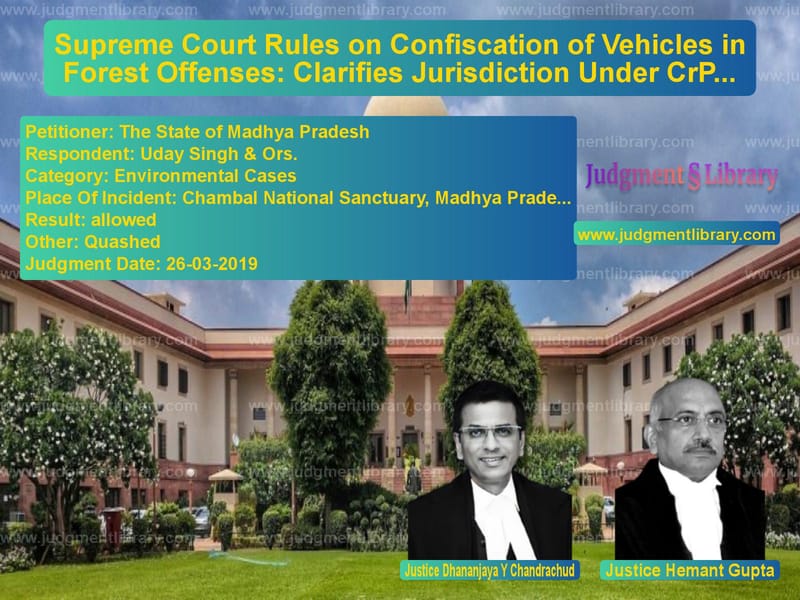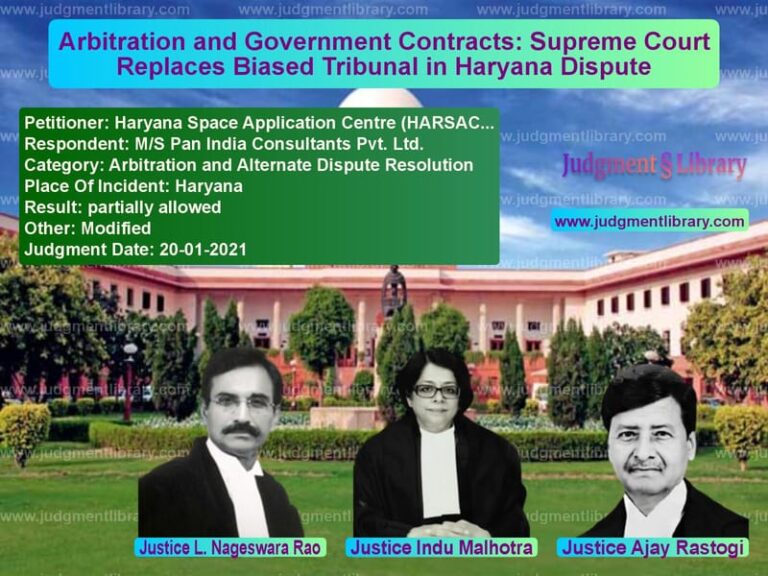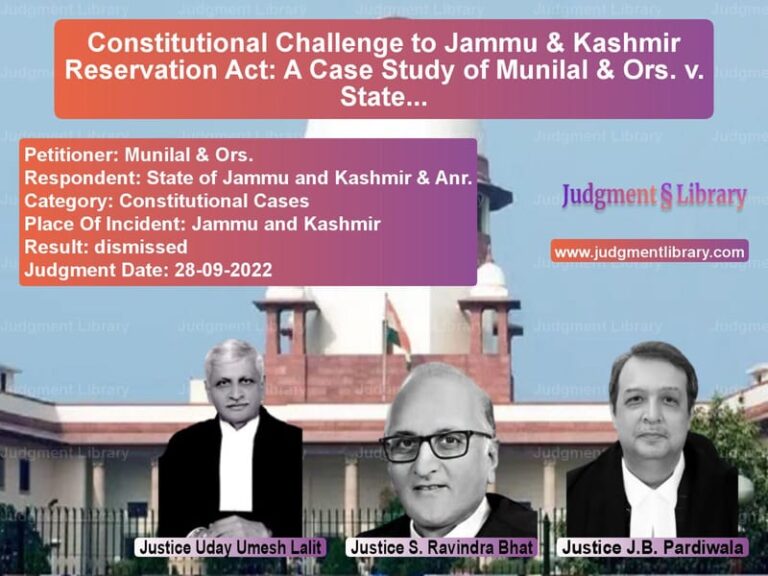Supreme Court Rules on Confiscation of Vehicles in Forest Offenses: Clarifies Jurisdiction Under CrPC
The Supreme Court of India recently delivered a significant judgment in the case of The State of Madhya Pradesh vs. Uday Singh & Ors., which dealt with the confiscation of vehicles involved in illegal sand mining under the Indian Forest Act, 1927. The Court ruled on whether the Magistrate had jurisdiction to release vehicles seized for forest offenses when confiscation proceedings had already been initiated under the Act.
The decision holds immense importance for environmental law enforcement and clarifies the legal position on the authority of Magistrates under the Code of Criminal Procedure (CrPC) in matters concerning forest offenses.
Background of the Case
The appeals before the Supreme Court arose from a judgment of the Madhya Pradesh High Court, which had directed the Magistrate to release vehicles that had been seized for illegally excavating and transporting sand from a protected area in the Chambal National Sanctuary.
The sequence of events was as follows:
- On 26 March 2011, Forest Officers apprehended tractors and trolleys carrying illegally excavated sand from Dalijeet Pura Ghat in the Chambal National Sanctuary without permission or a transit pass.
- The vehicles and sand were seized under Sections 41, 52, and 52-A of the Indian Forest Act, 1927, and Sections 27, 29, 39(1)(d), 51, and 52 of the Wildlife Protection Act, 1972.
- The vehicle owners applied for interim release of the seized vehicles before the Judicial Magistrate First Class (JMFC), Ambah, which was rejected on 21 April 2011.
- The revision petitions before the Additional Sessions Judge, Morena, were also dismissed on 16 June 2011.
- Subsequently, the owners approached the Madhya Pradesh High Court under Section 482 of the CrPC, and the High Court directed the Magistrate to release the vehicles.
Petitioner’s Arguments (State of Madhya Pradesh)
The State of Madhya Pradesh, represented by its counsel, raised the following arguments:
- The Magistrate had no jurisdiction to release the vehicles once confiscation proceedings under Section 52(3) of the Indian Forest Act had commenced.
- The High Court erred in directing release under Section 451 of the CrPC without considering that forest laws provide a separate mechanism for confiscation.
- The amendments made to the Indian Forest Act in Madhya Pradesh through MP Act 25 of 1983 excluded the jurisdiction of the Magistrate in such cases.
- Various Supreme Court rulings had upheld that once confiscation proceedings are initiated under forest laws, the jurisdiction of criminal courts to deal with the seized property is ousted.
Respondent’s Arguments
The vehicle owners contested the State’s position, arguing:
- The Magistrate had the inherent power under Section 451 of the CrPC to release the vehicles.
- The vehicles were used for transportation and their prolonged detention would lead to financial loss to the owners.
- The Indian Forest Act did not explicitly bar the Magistrate’s power to release property seized in forest offenses.
- The confiscation process was taking too long, and the delay caused unnecessary hardship to the owners.
Supreme Court’s Observations
The Supreme Court examined the provisions of the Indian Forest Act as amended by the Madhya Pradesh government and noted:
“Section 52(3) of the Indian Forest Act empowers the Authorized Officer to confiscate seized forest produce, tools, vehicles, and articles used in the commission of forest offenses. The moment confiscation proceedings are initiated, the jurisdiction of the Magistrate under Section 451 of the CrPC is ousted.”
The Court emphasized:
“The High Court erred in directing the release of seized vehicles by the Magistrate when confiscation proceedings were pending. The Forest Act is a special legislation aimed at preventing environmental damage and has an overriding effect over general criminal procedure provisions.”
Final Judgment
The Supreme Court ruled as follows:
- The appeals by the State of Madhya Pradesh were allowed.
- The judgment of the Madhya Pradesh High Court was set aside.
- The orders directing the release of vehicles by the Magistrate were quashed.
- Confiscation proceedings initiated under the Indian Forest Act were to proceed as per law.
The Court concluded:
“The legislative intent of forest conservation laws is to act as a deterrent against illegal activities. Any interpretation that weakens the purpose of these laws would be contrary to public interest.”
Implications of the Verdict
This ruling has major implications for environmental law enforcement and the powers of the judiciary:
- Strict Enforcement of Forest Laws: The judgment reinforces that once confiscation proceedings are initiated, the jurisdiction of Magistrates is excluded.
- Clarity on Special vs. General Laws: Special laws like the Indian Forest Act take precedence over general criminal procedure laws in cases of forest offenses.
- Deterrence Against Illegal Mining: The decision ensures that offenders cannot secure the early release of seized vehicles, thus discouraging illegal sand mining and deforestation.
- Judicial Restraint in Forest Matters: High Courts and Magistrates must exercise caution before interfering with the enforcement of forest conservation laws.
By upholding the authority of forest officers and ensuring stringent enforcement of environmental laws, this ruling serves as a landmark decision in strengthening India’s forest conservation efforts.
Petitioner Name: The State of Madhya Pradesh.Respondent Name: Uday Singh & Ors..Judgment By: Justice Dhananjaya Y Chandrachud, Justice Hemant Gupta.Place Of Incident: Chambal National Sanctuary, Madhya Pradesh.Judgment Date: 26-03-2019.
Don’t miss out on the full details! Download the complete judgment in PDF format below and gain valuable insights instantly!
Download Judgment: The State of Madhya vs Uday Singh & Ors. Supreme Court of India Judgment Dated 26-03-2019.pdf
Direct Downlaod Judgment: Direct downlaod this Judgment
See all petitions in Environmental Cases
See all petitions in Judgment by Dhananjaya Y Chandrachud
See all petitions in Judgment by Hemant Gupta
See all petitions in allowed
See all petitions in Quashed
See all petitions in supreme court of India judgments March 2019
See all petitions in 2019 judgments
See all posts in Environmental Cases Category
See all allowed petitions in Environmental Cases Category
See all Dismissed petitions in Environmental Cases Category
See all partially allowed petitions in Environmental Cases Category







